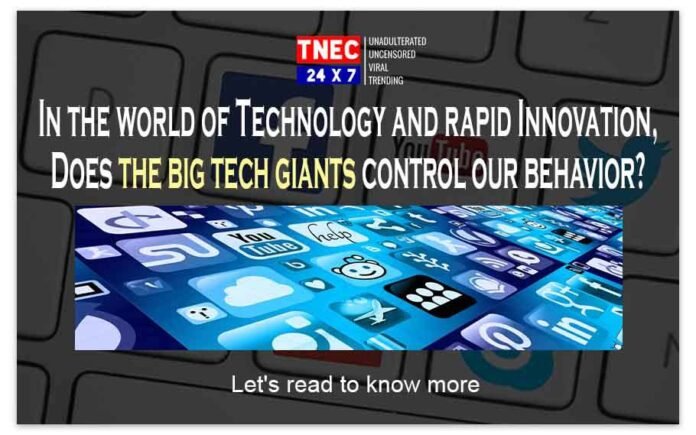By: Niladri Sekhar Dutta, The North-Eastern Chronicle.
Visual by: Pallab Neog
In today’s era we are mostly surrounded by technology. Everyone spends more than half of our day on our phones, laptops or any other electronic devices.
The world is witnessing a rapid innovation in technologies and that’s what fascinates us. It’s the big tech companies like Apple, Samsung etc that rule the technology market and we also praise them for their amazing products.
But are they really so amazing and why are we so much more into the world of technology? Do these big tech giants control us? If we still haven’t thought of it, let us know.
Role of big companies manipulating our behaviour

Tech companies such as Apple, Facebook and Google have their range of design and features into their mobile devices, operating systems and social media applications etc and maybe that’s what makes them addictive. As a result, it’s us spending longer online than we really want to, clicking on links we never intended to and making us more distracted, less rational than ever.
The tech giants are using our information and deliberately manipulating us on how we should use these platforms. The decision we come to on how to interact with tech platforms is something that should depend on us but it’s vice-versa.
Tech researchers and former employees in these tech companies also believe that all our minds can be hijacked. We are not as free as we think.
Tech companies deliberately make their products addictive, playing with our instinct to incentives, advertising and thus with these techniques they are most likely to grab people’s attention.
Using of special gesture to make us more addictive to our smartphones, laptops etc
Everyone of us who has a smartphone knows that it can be difficult to ignore that buzzing, beeping, incessantly illuminated screen that always distracts us.
The notification features that always engage us to our device. Let’s take, for instance, Instagram. It tells us when someone has followed or posted for the first time in a while, luring us to open the app and take a look.
Studies say an average person checks their phone 150 times a day, often unconsciously. We might get no new notifications or messages or a link to a funny meme from a friend etc. It’s the obligation factor that drives our impulse to check personal devices, triggering our brain that we might miss something important if we don’t.
Technology demands attention

Technology may be contributing to so-called continuous partial attention. In the attention driven economy they use advertising as a tool to distract us most of the time which actually prevents us from getting things done. But this is the complete opposite of what technology was intended to do. Isn’t it?
Secondly, the attention economy thrives on sensationalization, bate, and entertainment. Logically and as a result, the media is now more than ever biased in favor of that which is sensationalist and entertaining. The rational stuff is less likely to get attention than that which is impulsive.
Biased and Controlled tech reviews
We all look for tech reviews before buying any product or maybe sometimes rationally go through it. But are those reviews genuine or biased and even might be controlled by their behaviour too?
Now no matter how much we believe in it, how much the tech reviewers tell us but we still are not sure of it. The tech companies manipulate their behavior too, now we all see them doing free giveaways and telling us how good the product is but would they do giveaways of products that are good ? But that’s what the tech companies do sending the products for free giveaway, and controlling their mind before realizing and giving a genuine review.
What we can do to be less addictive and not controlled by these tech giants is to be more impulsive to trust our instinct rather than what the tech reviews or tech companies feed us.
As human beings we can control our behaviour and not be controlled by someone else. If we decide not to be more addictive and only give the minimum time to the digital world, we can use it in something more productive. There are pros and cons of this technologically driven digital world. It is us who have to be more careful and use it how it’s actually supposed to be used.












